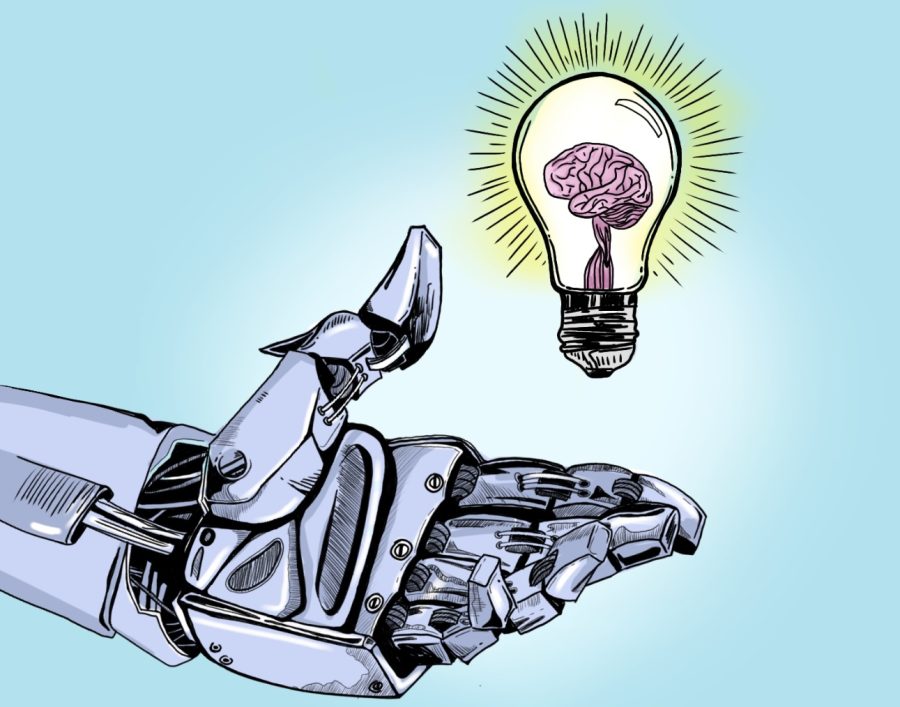AIs should be accepted, rather than feared
In the growing age of technology, artificial intelligence is being used to improve many areas of human life. Staff designer Jayden Chui thinks the development of AI should be embraced despite its controversy.
January 27, 2023
Artificial intelligence has recently been a subject of concern, with some individuals fearing that it would result in job loss, a loss of privacy or even the end of mankind as we know it.
However, people should look forward to AI, rather than fear it. Furthermore, since AI progress cannot be stopped or reversed, it is crucial that we accept it and seek to ensure that it is applied in a sensible way to advance civilization. This means investing in research and development, as well as creating policies and regulations to ensure that AI is used ethically and responsibly.
It is important to realize that AI has the ability to significantly improve human lives in a variety of ways. It can be used to automate tiresome and repetitive jobs, freeing up workers to concentrate on more gratifying and creative work. For instance, many people were upset when McDonald’s opened up a restaurant completely operated by AI, but these lost jobs may be pushed into other, more useful fields of labor.
A high school student working in a tutoring facility would be more socially optimal than a student working in a fast food restaurant. Rather than doing something that a machine can do equally as well, such as assembling a burger, a student can now tutor a child, ultimately teaching valuable skills and knowledge to other people that can help progress civilization.
Even if a worker who without a high school diploma or college degree were to lose a job that requires few qualifications to obtain (such as fast food), they would be incentivized to develop the necessary skills to obtain another job. Some may argue that some people do not have access to knowledge that can help them develop skills to obtain another job, but most places in the United States provide public libraries that are free to use, and even if an uneducated worker were to not have access to a library, there are still many jobs available that require few skills that he or she could work at, that would generally be considered more productive, such as a construction worker or janitor.
Students are not the only people that can help teach children. The sphere of education is another area where AI is having a significant influence. In order to provide each student with a unique learning experience that is tailored to their experience and skills, AI-powered tools can be utilized.
For example, Photomath is an AI-powered tutoring system that offers students real-time feedback and guidance in math, enhancing their ability to learn. This can help students who might not have the same access to resources as their peers, enabling them to catch up and succeed in mathematics.
AI can also be utilized to enhance decision-making by offering more thorough and reliable data analysis, assisting people in addressing some of the most important issues facing the globe today: climate change, decreasing poverty and enhancing healthcare.
Healthcare has already witnessed the introduction of AI technology with personalized medicine development. AI algorithms assist doctors in determining the most effective treatments for specific patients by evaluating enormous volumes of data, including genetic data and medical records. Better health outcomes and an all-around more effective healthcare system may result from this.
Overall, AI has the potential to help us to better understand our world. As AI becomes more advanced, it will be able to learn from and interact with humans in increasingly sophisticated ways; allowing us to gain insights into our own behavior and decision-making processes. This could lead to a deeper understanding of human psychology and behavior, which would have a wide range of applications, from improving education to advancing our understanding of the brain.
The technology can even be used to help us protect the environment and combat climate change. AI algorithms can be used to analyze data from sensors and satellites to identify areas where deforestation is occurring or where pollution levels are high. This information can then be used to target conservation efforts and enforce regulations more effectively.
It is critical to keep in mind that AI is a collection of technologies being developed and used by a diverse group of individuals with a variety of motivations and aims, rather than a single, monolithic organization. This implies that there will always be a human component to AI and that we have the power to direct its creation and application in ways that are consistent with our objectives and values.
Follow Jayden (@jchuiiii) and @CHSCampusNews on Twitter.












